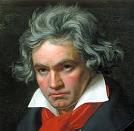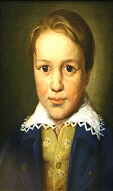Ludwig von Beethoven
Ludwig von Beethoven
Musical scholars have disagreed whether Ludwig von Beethoven should be placed within the Classical period or the later Romantic period. Indeed, his music spans the characteristics of both of these musical periods. His music quickly became considered some of the classical pieces in the repertoire, which suggested his music had much in common with that of composers like Mozart. However, his music is often more extravagant than much of the other music in the Classical period and is more reminiscent of the Romantic period in many ways.
Ludwig von Beethoven was born in 1770 in Bonn, Germany. His talent was visible at an early age, and, at the age of seventeen, he moved to Vienna, hoping to study with Mozart (although it is not clear whether the two ever met). He studied with Haydn for a time and quickly became known as a piano virtuoso, or master. Perhaps it is not surprising then that the piano would be at the forefront of many of Beethoven's compositions.
Beethoven as a child
Beethoven supported himself in Vienna through a number of means, with had become more common than patronage by the turn of the nineteenth century. He earned money from the sale of his published compositions, individual gifts from the wealthy, teaching private lessons, and subscription concerts. As with other composers at the time, this gave Beethoven more freedom to compose the music that he wanted rather than what someone else wanted.
One of the tragic aspects of Beethoven's life is that he began to lose his hearing by about the age of twenty-six. It began with a ringing in his ears that made it hard for him to hear his own music or the music of others. Despite this, Beethoven was able to continue composing. From 1800 to 1802, for example, he composed Moonlight Sonata, one of Beethoven's most popular sonatas. He was completely deaf by the year 1814. Yet, Beethoven continued to compose music and it is a testament to his talent that he was able to continue to create masterpieces despite never being able to hear them outside of his own head. His deafness did make playing concerts almost impossible though, which reduced his income. Beethoven died in 1827 at the age of fifty-seven from complications of lead poisoning. An autopsy also revealed liver damage, which some scholars argue may have been from excessive alcohol consumption.
| Beethoven: Fur Elise |
| Beethoven: Piano Sonata |
When examining Beethoven's music, scholars have noted that his compositions can be separated into three different time periods. His early work (from about 1779 to 1802) is similar in style to composers like Haydn and Mozart. It was during this time that he composed his first and second symphonies, as well as other works. The middle period of his work (from about 1803 to 1814) is characterized by larger scale works that often focus on heroism. He extended and experimented with the musical techniques and language that composers like Haydn and Mozart had used. These are the works that solidified Beethoven as a master of classical music. The late period of his work (from about 1815 to 1827) reflects a transition to the music of the Romantic period. The pieces are often more personal and more intense.
Beethoven's music is often characterized by emotional depth and majestic sounds. Like Haydn and Mozart, he composed in a range of different musical forms, and added innovation and new sounds to each form that he worked in. Both the personal humanism and the majestic, powerful music that he composed helped to make his music popular both in the Classical period and today.
In this unit, we learned more about the Classical period of music. In doing so, we learned how this music was influenced by other events during this time period as well as earlier periods of music. We also investigated the characteristics of music from the Classical era and some of the forms of music that were popular during this period. Finally, we learned more about three of the major composers during this time period, including Joseph Haydn, Wolfgang Amadeus Mozart, and Ludwig von Beethoven.
Think About
- What is the Classical era? When did it take place?
- What are the characterisitcs of music from the Classical era?
- What are some forms of music that were popular during this period?
- Who are some of the composers that created music during the Classical era?
- How does the music of the Classical Era compare to earlier time period?
Journal Activity: Answer these questions in your journal.
